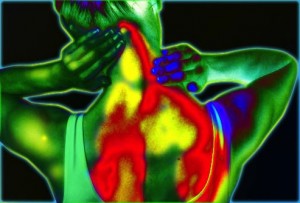[retweet][facebook]
 New research concludes that acupuncture reduces pain sensitivity for patients suffering from fibromyalgia syndrome (FMS). The study also showed that patients receiving acupuncture had significant reductions in anxiety and depression. Further, the overall quality of life score improved for FMS patients receiving acupuncture therapy.
New research concludes that acupuncture reduces pain sensitivity for patients suffering from fibromyalgia syndrome (FMS). The study also showed that patients receiving acupuncture had significant reductions in anxiety and depression. Further, the overall quality of life score improved for FMS patients receiving acupuncture therapy.
The treatment method was the application of five acupuncture points at a rate of once per week. The points were located in areas of discomfort near the occipital bone, rhomboid and trapezius muscles and in the region of the upper chest and lateral epicondyle. The results were published in the Journal of Acupuncture and Meridian Studies.
Fibromyalgia is a pain syndrome affecting the soft tissues and often involves sleep disturbances, tenderness at specific points, muscle pain, fatigue and depression. A literal translation of the term is pain of the muscles and fibrous tissues. Fibromyalgia is distinguished from most other forms of pain because it is non-nociceptive. Nociceptive pain involves inflammation and is triggered by pain receptors in the skin, muscles, joints and other tissues. FMS and other non-nociceptive types of pain conditions do not inherently involve inflammation and is a result of a disruption in central processing. Examples of non-nociceptive pain include irritable bowel syndrome, migraine headaches and FMS. It is estimated that FMS affects up to approximately 4% of the US population. In Chinese Medicine, FMS is due to Liver Qi stagnation, Bi syndrome, dampness with Wei Qi obstruction, Qi deficiency and Yin deficiency. Acupuncture and herbal medicine are commonly used to treat FMS. Biomedical treatments for FMS include anti-depressants, serotonin reuptake inhibitors, sleep drugs, pain medications and nutritional supplements.
 More Research
More Research
Another recent study published in Clinical Rheumatology concludes that acupuncture is effective for the treatment of fibromyalgia syndrome. The researchers concluded that acupuncture demonstrates definitive “beneficial effects” in the treatment of fibromyalgia. Researchers from the University of Maryland School of Medicine in Baltimore also conclude that acupuncture is significantly effective in the treatment of fibromyalgia syndrome in their new research. Other research performed at the prestigious Mayo Clinic College of Medicine in Rochester concluded that acupuncture is effective in treating fibromyalgia and showed specific efficaciousness in its ability to reduce pain, fatigue and anxiety.
The mounting evidence suggests that acupuncture is a primary treatment for FMS. Emerging integrative medical clinics within the hospital and general medical system are helping in the delivery of acupuncture services to patients. However, most acupuncturists have individual or family group style medical practices in the US.
Acupuncture Numbers
Currently, there are slightly over 20,000 licensed acupuncturists in the USA. California has the most acupuncturists with a total of 6,682. New York has 1,909 licensed acupuncturists followed by Florida with a total of 1,719. Those numbers are up from 2009 when California had 6,578 acupuncturists, New York had 854 licensed acupuncturists and Florida had only 2,027 licensed acupuncturists. Massachusetts comes in fourth place with a total of 1,048 licensed acupuncturists. Colorado has 893 acupuncturists, Oregon has 830 acupuncturists, Texas has 796 acupuncturists and Washington has 753 acupuncturists. The numbers begin to drop-off at this point with Maryland having 667 acupuncturists, Illinois with 587 and New Jersey with 567 acupuncturists. Many states have under 100 acupuncturists and 6 states do not even have acupuncture licensing laws at all. Acupuncture has been proven to be an important and effective method for the treatment of fibromyalgia syndrome but access to care remains an issue.
References:
Bastos, Jessica Lucia Neves, et al. “Effect of Acupuncture at Tender Points for the Management of Fibromyalgia Syndrome: A Case Series.” Journal of Acupuncture and Meridian Studies (2013).
An overview of systematic reviews of complementary and alternative medicine for fibromyalgia. Rohini Terry, Rachel Perry and Edzard Ernst. Clinical Rheumatology Volume 31, Number 1 (2012), 55-66, DOI: 10.1007/s10067-011-1783-5.
Berman BM, Ezzo J, Hadhazy V, Swyers JP. Complementary Medicine Program, University of Maryland School of Medicine, Baltimore 21207, USA. The Journal of Family Practice [1999, 48(3):213-218].
Mayo Clin Proc. 2006 Jun;81(6):749-57. Improvement in fibromyalgia symptoms with acupuncture: results of a randomized controlled trial. Martin DP, Sletten CD, Williams BA, Berger IH. Department of Anesthesiology, Mayo Clinic College of Medicine, Rochester, Minnesota.
